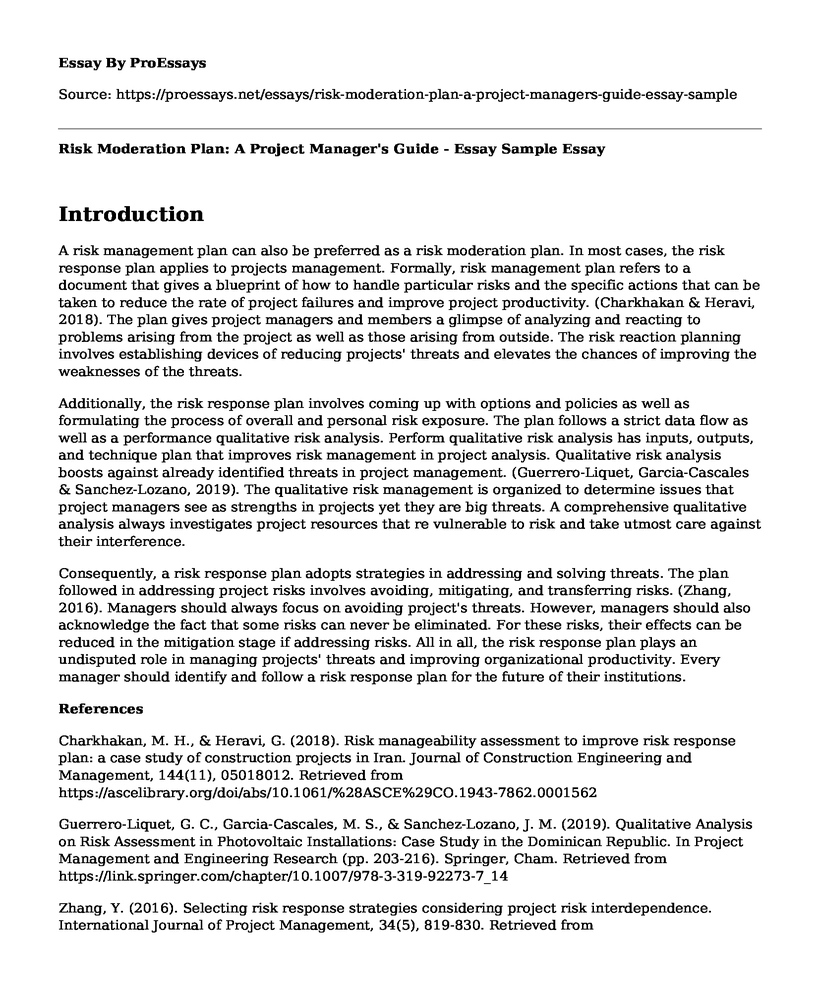Introduction
A risk management plan can also be preferred as a risk moderation plan. In most cases, the risk response plan applies to projects management. Formally, risk management plan refers to a document that gives a blueprint of how to handle particular risks and the specific actions that can be taken to reduce the rate of project failures and improve project productivity. (Charkhakan & Heravi, 2018). The plan gives project managers and members a glimpse of analyzing and reacting to problems arising from the project as well as those arising from outside. The risk reaction planning involves establishing devices of reducing projects' threats and elevates the chances of improving the weaknesses of the threats.
Additionally, the risk response plan involves coming up with options and policies as well as formulating the process of overall and personal risk exposure. The plan follows a strict data flow as well as a performance qualitative risk analysis. Perform qualitative risk analysis has inputs, outputs, and technique plan that improves risk management in project analysis. Qualitative risk analysis boosts against already identified threats in project management. (Guerrero-Liquet, Garcia-Cascales & Sanchez-Lozano, 2019). The qualitative risk management is organized to determine issues that project managers see as strengths in projects yet they are big threats. A comprehensive qualitative analysis always investigates project resources that re vulnerable to risk and take utmost care against their interference.
Consequently, a risk response plan adopts strategies in addressing and solving threats. The plan followed in addressing project risks involves avoiding, mitigating, and transferring risks. (Zhang, 2016). Managers should always focus on avoiding project's threats. However, managers should also acknowledge the fact that some risks can never be eliminated. For these risks, their effects can be reduced in the mitigation stage if addressing risks. All in all, the risk response plan plays an undisputed role in managing projects' threats and improving organizational productivity. Every manager should identify and follow a risk response plan for the future of their institutions.
References
Charkhakan, M. H., & Heravi, G. (2018). Risk manageability assessment to improve risk response plan: a case study of construction projects in Iran. Journal of Construction Engineering and Management, 144(11), 05018012. Retrieved from https://ascelibrary.org/doi/abs/10.1061/%28ASCE%29CO.1943-7862.0001562
Guerrero-Liquet, G. C., Garcia-Cascales, M. S., & Sanchez-Lozano, J. M. (2019). Qualitative Analysis on Risk Assessment in Photovoltaic Installations: Case Study in the Dominican Republic. In Project Management and Engineering Research (pp. 203-216). Springer, Cham. Retrieved from https://link.springer.com/chapter/10.1007/978-3-319-92273-7_14
Zhang, Y. (2016). Selecting risk response strategies considering project risk interdependence. International Journal of Project Management, 34(5), 819-830. Retrieved from https://www.sciencedirect.com/science/article/pii/S0263786316000338
Cite this page
Risk Moderation Plan: A Project Manager's Guide - Essay Sample. (2023, Mar 16). Retrieved from https://proessays.net/essays/risk-moderation-plan-a-project-managers-guide-essay-sample
If you are the original author of this essay and no longer wish to have it published on the ProEssays website, please click below to request its removal:
- Importance and Impact of Good Leadership and Management Skills Essay
- Leadership and Motivation Paper Example
- Essay Example on Comparing Corporate Bonds to Government Bonds: Risks & Rewards
- Essay Example on Performance Improvement: Essential for Business Success
- Essay Example on Leadership: How to Guide and Inspire Employees for Success.
- Paper Example on Stakeholder Management: Key to Successful Change Projects
- Free Report Sample on Enhancing Leadership Abilities for Army Success







